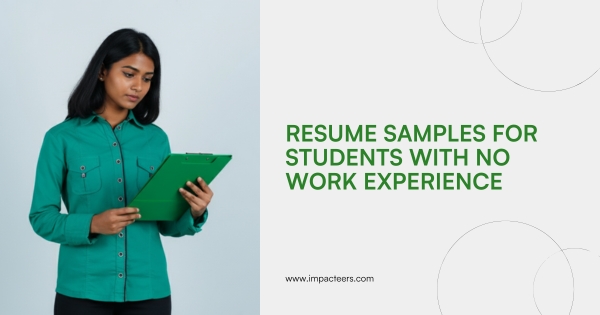Discover the key difference between Resume, CV, and Biodata. Get free templates, formats, and expert tips for freshers.

When it comes to applying for jobs, one of the first and most critical documents you need is a professional profile document. But which one should you use—a Resume, a CV (Curriculum Vitae), or a Biodata? Are they just different names for the same thing, or are they used for different purposes?
The confusion around these terms is especially common among freshers, college students, and even experienced professionals in India and abroad. Each of these documents has its own format, template, length, and purpose, and choosing the wrong one could affect your chances during interviews.
In this comprehensive guide, we’ll break down the difference between resume, CV, and biodata, provide examples and free format tips, and explain when and where to use each. Plus, we’ll introduce you to Impacteers Resume Builder, a powerful online tool to create professional documents that land jobs.
What Is a Resume?
A resume is a concise, focused document highlighting your skills, education, work experience, and achievements. It is tailored to a specific job or industry and is usually limited to 1–2 pages.
Best Used For:
- Private sector jobs
- Campus interviews
- Job applications in business, IT, media, etc.
Typical Resume Sections:
- Objective or Summary
- Skills
- Work Experience
- Education
- Certifications or Projects
- References (optional)
Key Traits:
- Highly customizable
- Easy to scan
- Focuses on relevance over detail
What Is a CV (Curriculum Vitae)?
CV stands for Curriculum Vitae, which is Latin for “course of life.” Unlike a resume, a CV provides a comprehensive history of your academic and professional achievements. It can be 2–5 pages or longer, depending on your experience.
Best Used For:
- Academic positions
- Research roles
- Fellowship or grant applications
- Jobs abroad (especially in Europe)
Typical CV Sections:
- Full Name and Contact
- Research Interests
- Education (detailed)
- Teaching Experience
- Publications
- Awards and Honors
- Professional Affiliations
Key Traits:
- Chronological
- Detailed and formal
- Not tailored for each job
What Is Biodata?
Biodata, short for Biographical Data, is more common in South Asia, especially India, for government jobs, matrimonial contexts, or traditional sectors. It includes personal information, such as religion, caste, height, and marital status—things that are never included in resumes or CVs.
Best Used For:
- Government job applications
- Matrimonial proposals
- Some state-level interview processes
Typical Biodata Sections:
- Name and Address
- Date of Birth
- Religion, Caste
- Marital Status
- Hobbies
- Education and Work Experience
Key Traits:
- Biographical focus
- Outdated for modern corporate jobs
- Still used in specific Indian contexts
Comparison Table: Resume vs CV vs Biodata
| Feature | Resume | CV | Biodata |
| Length | 1–2 pages | 2–5+ pages | 1–2 pages |
| Focus | Skills and relevance | Complete academic/professional life | Personal and demographic data |
| Used For | Corporate jobs | Academia, Research, Abroad | Govt jobs, matrimony |
| Personal Info | Minimal | Minimal | Extensive |
| Format | Flexible and tailored | Formal and standard | Basic and general |
| Common in | US, India (private sector) | UK, Europe, Academia | India, Bangladesh, Pakistan |
Which One Should Freshers Use?
For freshers, the ideal choice is usually a resume. It helps you:
- Showcase your strengths without too much clutter
- Highlight internships, certifications, and college projects
- Customize content for every job application
You can easily create one using a free resume maker or download a sample Word format. But remember, it’s not just about the layout—it’s also about the content.
Common Mistakes to Avoid in All Formats
| Mistake | Why It Hurts You |
| Mixing CV and Resume styles | Looks unprofessional |
| Adding unnecessary personal info | Inappropriate in modern job applications |
| Using outdated templates | Reduces your chances of standing out |
| Not tailoring to the job | Shows lack of interest |
| Spelling and grammar errors | Signals carelessness |
Pro Tip: Use an Online Resume Builder Like Impacteers
Instead of struggling with Word documents and templates, consider using Impacteers Resume Builder. It’s designed especially for Indian students, freshers, and professionals.
Why Impacteers Resume Builder Is a Game-Changer:
- User-friendly interface
- Resume formats accepted in corporate and campus interviews
- Built-in resume tips for freshers
- Online resume creation in minutes
- Option to download in PDF or Word
It also aligns with your job search and skill profile, integrating learning and resume-building into one platform.
Tips for Formatting Your Resume, CV, or Biodata
- Use clean, modern fonts (Arial, Calibri)
- Stick to black and white (no fancy colors)
- Save your file as YourName_Resume.pdf
- Ensure alignment and bullet point consistency
- Use tools like Grammarly to avoid typos
Conclusion
Understanding the difference between resume, CV, and biodata can help you present yourself effectively in the job market. Each document serves a unique purpose. Choose the right one based on your career path, region, and the type of job you’re applying for.
In today’s digital-first job landscape, your resume is your first handshake with the recruiter. Make sure it’s sharp, relevant, and easy to read. And if you need help building one, Impacteers Resume Builder is here to guide you with smart formats, personalized suggestions, and career-ready templates.
Don’t just download a sample—build something that reflects YOU.
FAQs
Q1. Can I use a CV instead of a resume for private sector jobs?
A: Not recommended. CVs are too detailed and academic. Stick with a short, skills-based resume for private and IT sector jobs.
Q2. Is biodata still used for job applications?
A: Rarely, except in government or clerical positions in India. Avoid using biodata for corporate or tech interviews.
Q3. How can I build a resume without experience?
A: Focus on skills, college projects, internships, and certifications. Use the Impacteers Resume Builder to craft a fresher-friendly format.
Q4. Should I use free Word templates from the internet?
A: Be careful. Many are outdated or not ATS-friendly. Use professional builders or updated templates for best results.
Q5. Do companies prefer online resumes?
A: Yes. Always keep a PDF version of your resume ready to upload or email. Online resumes are faster to share and process.



Post Comment